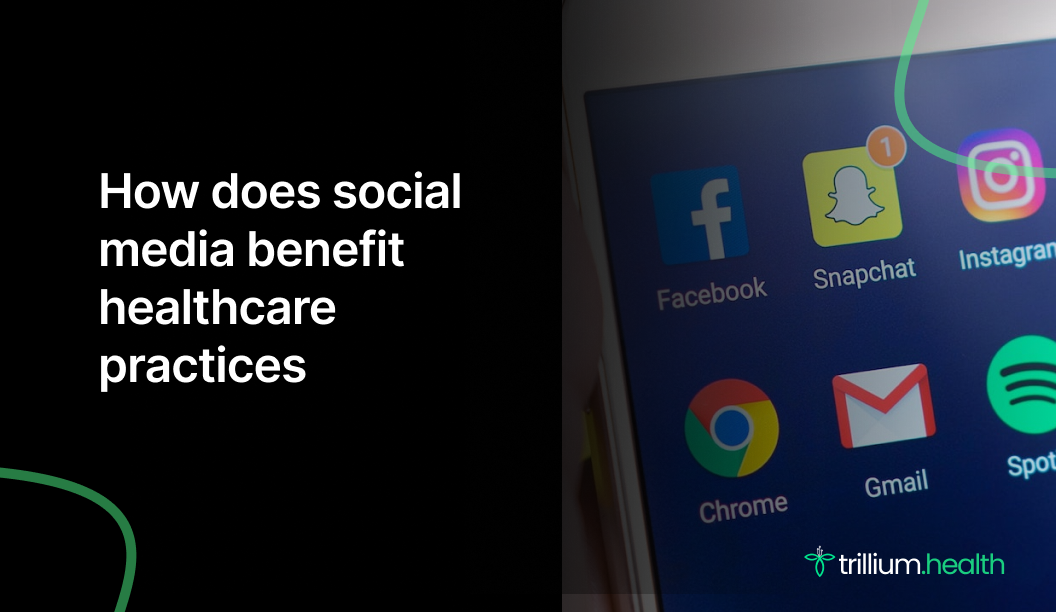The healthcare industry has always been at the forefront of adopting new technologies and trends to improve patient care and outcomes. In recent years, social media has emerged as a powerful tool for healthcare providers, offering a range of benefits and opportunities.
By leveraging social media platforms, healthcare professionals can engage with patients, share information, and build their brands in ways that were once impossible. From improved communication and patient engagement to cost-effective marketing and real-time crisis management, social media has become a boon for the healthcare industry.
In this digital age, healthcare organizations that embrace social media stand to gain a competitive advantage and enhance their ability to deliver high-quality care to patients. With 302.25 million social media users in the United States, the opportunities for a practice to thrive via social media is endless.
Benefits of social media for healthcare practices
Healthcare practices use social media platforms to improve patient education, build brand awareness, increase website traffic, and as a platform for healthcare marketing.
However, the benefits of social media for the healthcare industry continue beyond there. Here are a few advantages that your practice can gain with factual, engaging, and informative content:
Raising public awareness
By leveraging social media platforms, healthcare practices can share valuable information about new treatments, research, and other developments in the industry with a broader audience. More importantly, providers can use it to inform the public of the latest health guidelines and adversaries.
By building a strong online presence, healthcare practices can establish themselves as trusted sources of information, which can help to improve patient outcomes and encourage more people to seek healthcare services.
Raising public awareness also holds power to fight misinformation. Content verified by healthcare providers helps build trust with your audience with truth. Providing the source link with your posts can help users to access more information on the subject.
Enhancing patient engagement
42% of social media users use the platform for healthcare information, seeking valid and credible information from healthcare facilities or providers.
By leveraging social media platforms, healthcare providers can communicate with their target audience in real-time, respond to questions and concerns, and provide ongoing support and guidance.
Social media enables healthcare providers to establish a more personal connection with their patients, essential for building trust and enhancing engagement. You can share personal stories, behind-the-scenes glimpses of their practice, and other humanizing content that helps patients see them as more than just medical professionals.
In addition, social media acts as a platform for patients to share their experiences, provide feedback, and connect with others who may be going through similar health challenges.
Providing accurate medical information
By sharing accurate information and countering misinformation, healthcare practices can help to promote public health and prevent the spread of false information.
You can fight misinformation only by making a large audience aware of scientifically correct healthcare information. Be it eating habits, skincare, cardiology, pediatrics, or, more importantly, events like a pandemic, use social media to engage with the public more meaningfully, building trust and promoting health literacy.
To strengthen your content credibility, provide visuals and physician quotes, and cite the source. In addition, educate your audience on how to identify misinformation with steps like:
-
Assessing the source
-
Don’t fall for clickbait headlines
-
Verify the author, organization, and publishing date
-
Cross-check the facts with other sources
Real-time crisis management
While 88% of people use social media for healthcare information, only 66% of patients are likely to trust information from a doctor.
In times of crisis, such as public health emergencies, or other unforeseen events, social media allows healthcare practices and providers to quickly and efficiently communicate important information to their patients and the public.
During a crisis, you can use social media platforms to share real-time updates, such as changes to operating hours, closures, and updates on the status of the situation. It helps to keep patients informed and reduces confusion and uncertainty.
Furthermore, you can use social media to dispel any myths or misinformation circulating during a crisis. It also enables you to share accurate and up-to-date information on how to stay safe and healthy during the crisis, what symptoms to look out for, and when to seek medical attention.
Easy reach to the specialists
Social media allows healthcare providers to deliver valuable resources and information to their patients and the wider community.
As they can reach a broad audience, healthcare organizations, and specialists can give their knowledge by hosting live Q&A sessions, responding to patient questions and concerns, and providing personalized recommendations and advice.
By creating and sharing educational content, providing access to important health resources, and connecting with patients directly, healthcare providers can use social media to improve patient engagement and promote better health outcomes.



